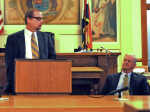Drug court graduate in class of 1

Editor's note: Partic-ipants in the Adult Recovery Court are granted anonymity under conditions of the program. Nevada Daily Mail grants the request for anonymity by those who do not want their name or photograph published.
The Vernon County Adult Recovery Court program held its 30th graduation ceremony Tuesday night, honoring one young man -- the 70th graduate of the program.
Addressing the graduate and his family, Presiding Judge James R. Bickel said recovery court changes lives, families and spares children from some of the problems associated with growing up in an alcoholic or drug-use environment.
The program, he said, is about giving participants a "chance to change their lives."
Bickel introduced the members of the recovery court committee -- made up of representatives of various local agencies and mental health care providers. A few of the members include Nevada Police Chief Graham Burnley, Pete Schmidt, Jennifer Byers, Jennifer Thomas, David Heumader, Stan Ford and J.B. Wolverton, all of whom attended the graduation.
Bickel then introduced guest speaker Souder Tate, a lawyer, Christian County Drug Court member and Greene County DWI Court member.
Tate has been involved in similar, court related recovery programs for several years.
Tate said he knows from past experience that jail is not the answer to alcoholism or addiction, and simple alcohol or drug rehab treatment programs aren't very successful. Drug court programs are more successful because they are "treatment with teeth."
By participating in a drug court program, a participant gets another chance but is still held accountable for their actions. It's hard work.
Tate said changing the way a person thinks during the course of their program is what keeps them strong after graduation.
Graduates should think about the consequences of their actions and be thankful for the second chance they have been given, Tate said, as he recommended participants surround themselves with people who will point out faulty thinking.
He also recommended finding five things to be thankful for and consider every day "a special blessing."
Mary Ireland of the United Methodist Women presented the graduate with a prayer shawl made specifically for the occasion and told the young man she prayed over it while making it and would continue to pray for him.
Stan Ford of Pathways Community Health, the graduate's counselor during his recovery, said the young man started out a little bit arrogant but soon became "a pleasure to work with."
The graduate had a family history of alcoholism and was facing felony DWI charges when he got into the program, Ford said.
The graduate relayed that he didn't want that for his family, nor did he want to lose his good job and lose it all. Ford said the man became motivated to be successful and dedicated himself to the program. He made it through in 19 months.
The graduate had lost his driver's license when he started in the program, but he has since regained it and kept his good job -- which allowed him to pay the considerable fees associated with the recovery court program.
His family is still together and he has made a commitment to others in the program to be there for them whether they need a ride or just someone to listen.
Before closing the ceremony, Bickel presented the young man with a certificate of graduation and an assurance that like other graduates before him, the charges against him would be dismissed with prejudice, meaning they will not show up on his record and can never be filed again.
The dismissal of charges is done by the prosecutor and he was unable to be at the ceremony.
After the ceremony a brief time was allowed for photographs and friends and family members to congratulate the graduate.
Refreshments were served in the hallway outside the courtroom.
